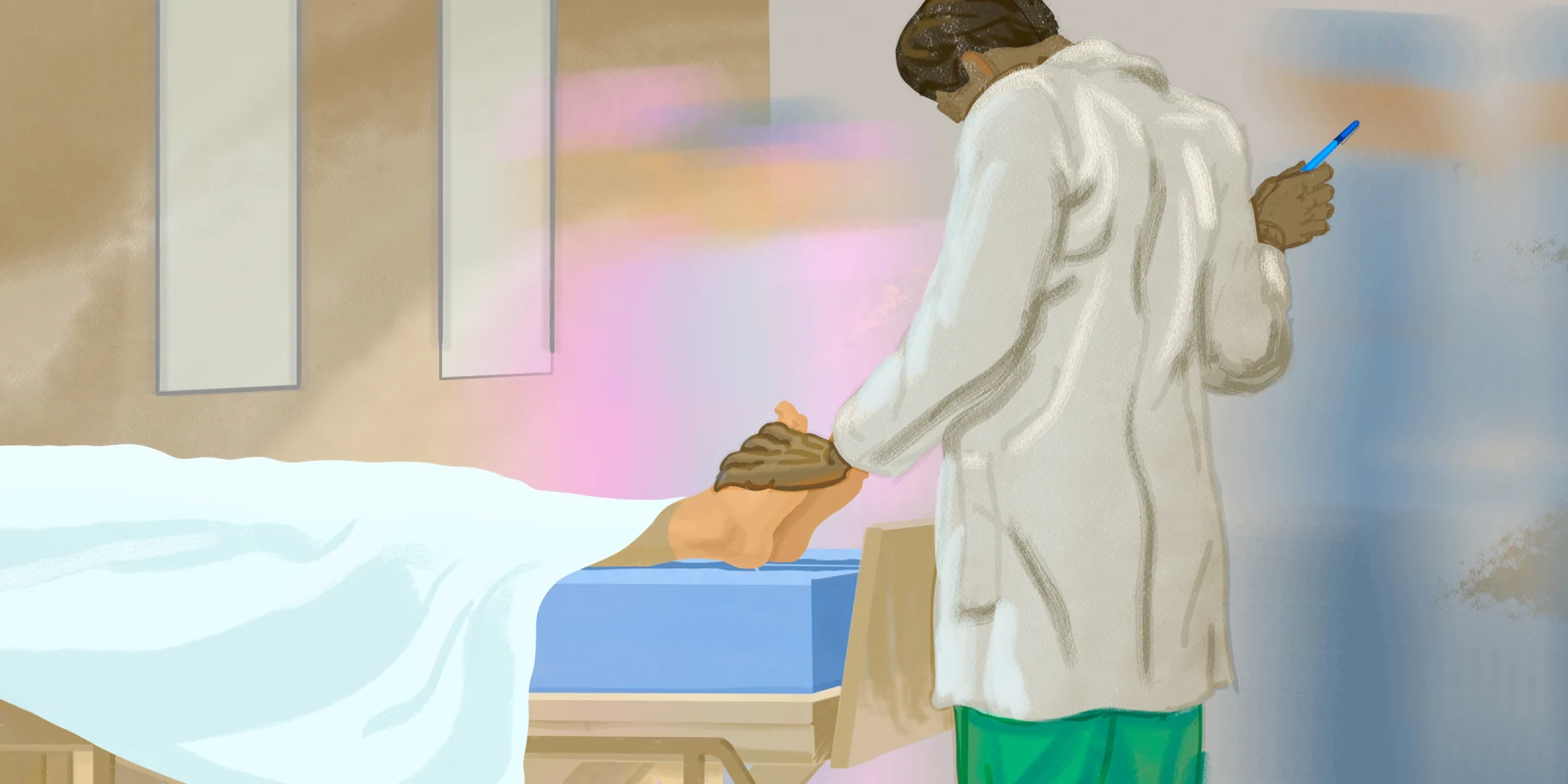Ms. Wilson had not always been so frail. A stuffed animal at her bedside hinted at youthfulness and vivaciousness, and when she was awake and alert, she demonstrated a quick wit and understated sense of humor. The octogenarian had been admitted to the hospital because of a ruptured abdominal aortic aneurysm, and after it was repaired, she developed difficulty breathing. She could no longer rise out of bed without significant assistance.
It was April — the cruelest month according to T.S. Eliot — and I was a third-year medical student in New Hampshire completing my sub-internship, an audition of sorts for the role of a junior doctor, which I would soon become.
On a sunny Wednesday morning, around 8 a.m. I went to see Ms. Wilson. Her medical status had improved significantly, and she was to be discharged to a nursing facility that day.
“Good morning, Ms. Wilson! You’re getting out of the hospital today,” I greeted her, as I listened to her heart and lungs with my stethoscope. Her heart was beating vigorously, and I could hear air rushing through her lungs.
I stepped out of Ms. Wilson’s room to round on a patient in an adjacent room. As I stood in the hallway sanitizing my hands, Ms. Wilson’s nurse rushed to me with an alarmed look.
“Ms. Wilson is having hemoptysis,” the nurse told me breathlessly.
I paged my attending: “Ms. Wilson Room 141 – 50ml hemoptysis” and ran into her room. She was losing consciousness. I quickly listened to her lungs. Now I could only hear coarse crackles, a sign that fluid had filled her lungs. Likely blood. “Hang in there, Ms. Wilson,” I said, trying not to sound panicked.
The attending came in, flanked by other medical personnel. “Get IVs in her. Give her blood. Let’s try to push some fluids into her. Ms. Wilson, if you can hear us, we are doing our best to help you right now!” He turned to me and calmly said, “Call the family. We need to notify them.”
A nurse handed me the phone number of Ms. Wilson’s daughter, Laura. I dialed the number, my hand shaking. She had visited the hospital the previous day, and we had spoken in person, when I told her that Ms. Wilson would soon be discharged. Now, the news was much different.
As I dialed Laura’s number, I thought about what I had learned about breaking bad news. I found a quiet corner to call from. I remembered the importance of introducing myself up front and breaking the bad news quickly, without pretense or circumlocution. I also knew it was crucial to emphasize that we had worked with Ms. Wilson as a team, as each patient’s care is a collaboration between clinicians. And my attending was nearby, able to lend his expertise in case it became necessary.
Laura picked up on the third ring.
“Hi Laura,” I began. “My name is Sathvik. I am the medical student working with your mom; we spoke yesterday.”
“Yes, I remember,” she said, likely noticing my voice quivering. “How is my mom? Is everything okay?”
“Actually, Laura, Ms. Wilson began coughing up blood this morning. And we were unable to stop it. We worked as a team, and we did everything we could. But Laura, I’m sorry. Ms. Wilson has passed away.”
The other end of the line was silent. Then through tears, Laura responded. “I knew she was not doing too well. Thank you. Thank you for all you did. I will be there soon.”
Bad news can rarely be broken in one conversation, and I knew it was important to follow-up after such a conversation. I would speak to Laura in person when she arrived at the hospital. “I will see you soon,” I responded. “Drive safely.”
After I set down the phone, I saw the attending doctor, who had been observing my call, had tears welling in his eyes. “No matter how many times a patient dies under your care, it never gets easier,” he told me. “Let’s take 10 minutes. Go on a walk, and gather yourself. We have other patients to take care of.”
A couple of hours later, the senior doctor and I met with Laura and other family members in Ms. Wilson’s room to pay our respects. The nursing staff had cleaned the room, and Ms. Wilson’s face looked at peace. After we left the room, the attending doctor pulled me aside again.
“You’ll always remember your first death. You may forget Ms. Wilson’s name, but you’ll always remember her. And as a medical professional, if there is a balance between caring too much for our patients or not caring enough, I’d rather care too much.”
So many people have died in the hospital in the last year, many of them alone. Doctors and nurses were the last humans they saw before passing. I agree with my attending doctor. In this profession, I would rather care too much.
While in our profession we deal with illness daily and death all too often, each patient is also someone's loved one. Therefore, if we need to break bad news such as a patient's death, we should remember that while for us, breaking bad news is part of our job, for our patients and their families, it is their lives at stake. So, we should be purposeful in these conversations, and if we speak with purpose, honesty, and humility, we will be shown grace and kindness in return.
Every morning now, when I enter the hospital, I think of Ms. Wilson and her family. I think of my phone conversation with Laura, and I think of the calmness of Ms. Wilson’s face after she died. I think of kindness, and forgiveness, and grace.
What do you remember from your first patient death? Share the lessons that have carried with you in the comments.
Sathvik Namburar, originally from Duluth, GA and a graduate of Johns Hopkins University, is currently a medical student at Dartmouth College in Hanover, NH. His writing has been published in USA Today, Boston Globe, and Baltimore Sun, among other publications. His interests include public health policy and health care equity, as well as global health. He is a 2021–2022 Doximity Op-Med Fellow.
All names and identifying information have been modified to protect patient privacy.
Illustration by Jennifer Bogartz







